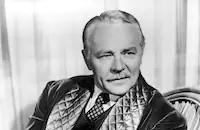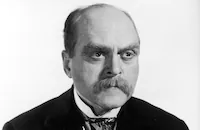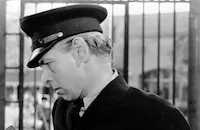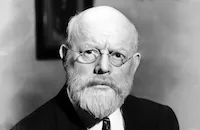It Happened on 5th Avenue

Brief Synopsis
Cast & Crew
Roy Del Ruth
Don Defore
Ann Harding
Charles Ruggles
Victor Moore
Gale Storm
Film Details
Technical Specs

Synopsis
On New York City's Fifth Avenue, the "richest avenue in the world," a tour bus announcer points out the boarded-up townhouse of "industrial wizard" Michael O'Connor, the world's second richest man. As the bus passes, a middle-aged drifter and his dog Sam enter the O'Connor house through a loose board in the fence and a manhole, and spend the night. Meanwhile, O'Connor evicts the tenants of one of his city apartment houses in order to erect an eighty story building. One of his tenants, Jim Bullock, an out-of-work veteran, refuses to leave. He is eventually thrown out, and while sleeping on a park bench, meets the drifter, Aloysious T. McKeever, or "Mac." Mac invites Jim to stay with him at O'Connor's townhouse, which he has occupied for the last three winters while O'Connor resides in Virginia, and Jim assumes that Mac is O'Connor. Currently, O'Connor is preparing to buy Camp Kilson, a deserted army camp outside Manhattan, in order to build a massive air cargo network. He receives word that his daughter Trudy has run away from her finishing school. When Trudy arrives at the townhouse, Jim concludes that she is a thief, but lets her stay. Trudy quickly falls in love with Jim, and is determined to keep her identity a secret so that he won't love her for her money. When the night patrol arrives to check the house, Mac makes everyone hide and finally confesses to Jim and Trudy that he is an interloper. Later, Jim meets two friends from the service, Hank and Whitey, and their wives and children, who are living in a car due to the postwar housing shortage, and invites them to stay at the townhouse, too. With Mac's help, Jim, Whitey and Hank are inspired to design a model to renovate vacant army barracks into housing projects, and decide to bid on Camp Kilson. Soon O'Connor arrives in New York and finds Trudy leaving for her new job at a music shop. Although he orders her back to school, she insists that she has spent her life being lonely and now wants Jim. O'Connor wants to meet Jim and reluctantly agrees to pose as a drifter, after which Trudy and Jim convince Mac to let O'Connor become another "guest" at the mansion. It is not long before O'Connor is fed up with his house guests and threatens to call the police. Trudy sends for her mother, however, who years before reluctantly divorced O'Connor because business was his first priority. Mary and O'Connor rekindle their love for each other, and on Christmas Eve, Mac encourages them to marry, unaware of their true relationship. When Mary finds out that O'Connor outbid Jim on Camp Kilson, and tried to give him a job in Bolivia, to take him away from Trudy, however, she determines to leave him. After Trudy also scolds him, O'Connor lets Jim buy the camp. On New Year's Eve, the houseguests all celebrate the contract, and prepare to leave the townhouse. Although Trudy and Jim and Mary and O'Connor offer Mac a room, he assures them he has a place to stay, O'Connor's house in Virginia, then says goodbye. O'Connor tells Mary that next November, Mac will be coming through the front door.

Director

Roy Del Ruth
Cast

Don Defore

Ann Harding

Charles Ruggles

Victor Moore
Gale Storm

Grant Mitchell

Edward Brophy

Alan Hale Jr.
Edward Ryan Jr.
Cathy Carter
Dorothea Kent

Arthur Hohl
Anthony Sydes
Linda Lee Solomon
Garry Owen
George Lloyd
George Meader

John Hamilton
John Arthur
Chester Clute

Howard Mitchell
Rowland Mccracken
William Kline
Al Fenney
Al Winters
Bert Howard
Jack George
Maj. Philip J. Kieffer
George Blagoi
Carl Leviness
Adolph Faylauer
William O'brien
Vic Travers
David Martell
Florence Auer

Charles Lane
James Cardwell

James Flavin
Ed Gargan
Dudley Dickerson
Eddie Marr
Pat Goldin
Vera Lewis
Abe Reynolds
Max Willenz
Leon Belasco
Jean Andren
Crew
Ray Boltz
Clarence Bricker
Glenn Cook
Lewis Creber
Roy Del Ruth
Roy Del Ruth
Frank Fox
Everett Freeman
Willard George
Richard Heermance
Corson Jowett
Joe Kaufman
Vick Knight
Herbert Clyde Lewis
Lorraine Maclean
Ben Markson
Harry Revel
Harry Ross
Henry Sharp
Frederick Stephani
Edward Ward
Paul Webster
T. K. Wood

Videos
Movie Clip



Hosted Intro






Film Details
Technical Specs

Award Nominations
Best Writing, Screenplay
Articles
It Happened on Fifth Avenue
Oscar®-winning director Frank Capra (It Happened One Night [1934], It's a Wonderful Life [1946]) originally acquired the rights to the story of It Happened on Fifth Avenue, written by Herbert Clyde Lewis and Frederick Stephani. However, Capra ultimately let the property go and passed it on to Allied Artists, a new subsidiary of Monogram Pictures, a studio known for making B movies. Allied Artists had been established for bigger budget releases or, as Monogram contract player and Fifth Avenue ingénue Gale Storm put it in her 1981 autobiography I Ain't Down Yet, "to make major movies that wouldn't be embarrassed by the Monogram banner." It Happened on Fifth Avenue would be Allied Artists' first feature with Roy Del Ruth directing.
Actress Gale Storm was always sorry that Frank Capra hadn't been the one to direct It Happened on Fifth Avenue. The material was decidedly "Capra-esque" - a warmhearted human story about the "little guy" with underlying social and political commentary -- and would have suited his trademark directing style well. Director Roy Del Ruth, she felt, didn't make the most of the story's potential. Storm was also upset with Del Ruth because he wouldn't allow her, a trained singer, to perform her own songs in the film. "I had two songs to do, and I was very excited," said Storm in her autobiography. "I'd done songs in other movies, but they were low-budget productions. The sky was the limit in this one, and I figured my numbers would have high values."
Storm began rehearsing for the songs immediately, only to be told a short time later that she would be lip-synching to someone else's voice. "I couldn't believe it," she said. "I thought that maybe the director didn't know I'd been singing and dancing in films, and that if I spoke to him he'd let me do my own numbers. Well, I asked him, and he said no. I asked him to look at some of my musicals, and he said no. I asked him if I could sing for him, and he said no. His theory was that if you were a dancer, you didn't sing; if you were a singer, you didn't dance; and if you were an actor, you didn't sing or dance. It was humiliating."
"I wasn't the only one Del Ruth humiliated," continued Storm. "Victor Moore was a dear sweet old man who was kind to everyone; we all loved him. Except Del Ruth. Whatever Victor did, the director made him redo it -- again and again. And Del Ruth never told the old man what he might have been doing wrong."
Even without the "Capra Touch" It Happened on Fifth Avenue still managed to do solid business at the box office and generate positive word of mouth. The New York Times called Victor Moore's performance "charming" and went on to say, "Mr. Moore gives a funny imitation of a tramp living like a king. And as the granite-grained gent who owns the mansion and joins the guests as a tramp himself, Charlie Ruggles is equally competent in his contribution to the topsy-turvy farce. Happy to say, the batch of authors have played off the two men artfully and have got some amusing social comment in the temporary reversal of their roles."
It Happened on Fifth Avenue received one Academy Award nomination for Best Writing, Original Story, but lost to another holiday-themed classic, Miracle on 34th Street (1947).
Producer: Roy Del Ruth
Director: Roy Del Ruth
Screenplay: Everett Freeman; Vick Knight (additional dialogue); Herbert Clyde Lewis (story); Frederick Stephani (story)
Cinematography: Henry Sharp
Art Direction: Lewis Creber
Music: Edward Ward
Film Editing: Richard Heermance
Cast: Don DeFore (Jim Bullock), Ann Harding (Mary O'Connor), Charles Ruggles (Michael J. 'Mike' O'Connor), Victor Moore (Aloysius T. McKeever), Gale Storm (Trudy O'Connor), Grant Mitchell (Farrow), Edward Brophy (Gates Patrolman Cecil Felton), Alan Hale, Jr. (Whitey Temple), Dorothea Kent (Margie Temple).
BW-116m.
by Andrea Passafiume

It Happened on Fifth Avenue
Quotes
Trivia
The first release by Allied Artists.
Notes
This film was the first produced under the Allied Artists brand. Allied Artists, which was formed in November 1946, was a wholly-owned subsidiary of Monogram Pictures Corp. and initially the producing arm for Monogram's high-budget pictures. In September 1952, Monogram announced that henceforth it would produce only films bearing the Allied Artists name.
Portions of this film were shot at Newport News, VA. According to a Hollywood Reporter news item, footage of the first post-war Easter parade on New York City's Fifth Avenue, on April 21, 1946, was shot for the film. To promote the picture, Monogram sponsored a parade in Manhattan with New York's Fifth Avenue Merchants Association, as well as a six-week cross-country bus tour, which ended in Los Angeles. Hollywood Reporter also notes that the film's songs were to be published by Chappell and Co. and released in time for the picture's Easter week opening. Harry Revel's "That's What Christmas Means to Me" became a minor Christmas standard. Herbert Clyde Lewis and Frederick Stephani were nominated for an Academy Award for Writing (Original Story) for the film. Don DeFore and Charlie Ruggles reprised their roles in a May 19, 1947 Lux Radio Theatre broadcast, co-starring Victor Moore.

Miscellaneous Notes
Released in United States Winter February 1947
Released in United States Winter February 1947













